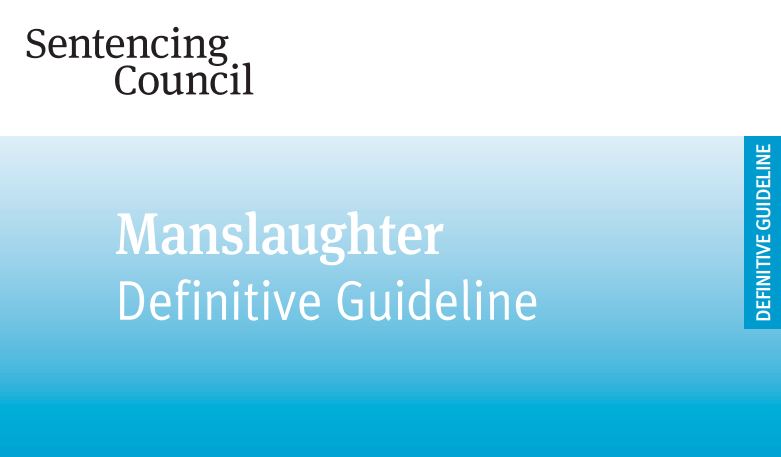The Sentencing Council, responsible for setting sentencing guidelines in England and Wales, has today issued a new sentencing guidelines for manslaughter offences.
Which offences are covered by the new sentencing guidelines for manslaughter offences?
The guideline covers:
- Unlawful act manslaughter – a common law offence
- Gross negligence manslaughter – a common law offence
- Manslaughter by reason of loss of control – a statutory partial defence to murder (sections 54 and 55 of the Coroners and Justice Act 2009)
- Manslaughter by reason of diminished responsibility – a statutory partial defence to murder (section 2 of the Homicide Act 1957)
The offence of corporate manslaughter is covered by the Council’s health and safety sentencing guidelines.
When does the guideline take effect?
The sentencing guideline for manslaughter offences applies to all offenders sentenced on or after 1 November 2018. This means that if you are charged before the guideline comes in to force, you may still fall to be sentenced in accordance with it if you plead guilty or are convicted.
What are the different types of manslaughter?
Unlawful Act manslaughter
This is the most commonly prosecuted form of manslaughter and includes deaths that result from assaults where there was no intention to kill or cause very serious harm. The circumstances can vary greatly.
For example, it could involve a situation where two friends briefly argue and one pushes the other causing him to fall and hit his head with fatal results.
Alternatively, it could involve someone going out looking for a fight and attacking someone forcefully but not intending to kill.
It could also include unintended deaths that result from other crimes, such as arson or robbery.
105 offenders were sentenced for this offence in 2016.
Gross negligence manslaughter
This occurs when the offender is in breach of a duty of care towards the victim which causes the death of the victim and amounts to a criminal act or omission.
The circumstances can again vary greatly. In a domestic setting it could include parents or carers who fail to protect a child from an obvious danger. In a work setting, it could cover employers who completely disregard the safety of employees.
Just 10 offenders were sentenced for this offence in 2016.
Manslaughter by reason of loss of control
This arises if the actions of an offender, who would otherwise be guilty of murder, resulted from a loss of self control. An example might be where there was a fear of serious violence.
12 offenders were sentenced for this offence in 2016.
Manslaughter by reason of diminished responsibility
Someone guilty of this offence would have been suffering from a recognised mental condition that affected their responsibility at the time of the offence, without which they would have been convicted of murder.
26 offenders were sentenced for this offence in 2016.
Why has this guideline been issued?
The new sentencing guidelines for manslaughter offences will ensure there is comprehensive guidance where previously such guidance was very limited.
Until now, there has been a guideline only for corporate manslaughter, which comes under the Council’s health and safety offences guideline. The only other guideline was issued by the Council’s predecessor body for manslaughter by reason of provocation. This is now out of date following legislative changes to the partial defences to murder.
The full guideline can be found here:
Manslaughter Definitive Guideline
Will sentence length increase?
The Sentencing Council predicts only a minimal impact, suggesting that only around ten extra prison places will be needed per year as a result of the guideline. It cautions, however, that ‘it is difficult to ascertain how sentence levels may change under the new guideline.’
Experience tells us that there is a certain degree of sentence length ‘creep’ following the implementation of new guidelines. Our advocates are trained in the use of all sentencing guidelines and equipped to ensure that judges apply them correctly.
Contact a criminal law specialist
As the new sentencing guidelines for manslaughter offences show, manslaughter will always be treated seriously by the courts. The issues that arise in the defence of such cases will be complex.
As a result, if you are arrested or know that the police wish to speak to you about an offence of manslaughter then make sure you insist on your right to free and independent legal advice.
The advantages of such early advice legal advice can be found here.
If you have already been interviewed or face court proceedings we can still make a real difference to the outcome of your case. Legal aid may well be available to fund your defence at court.
We have offices across the East Midlands. You can find your most convenient office here. Alternatively you can contact us using the form below.



